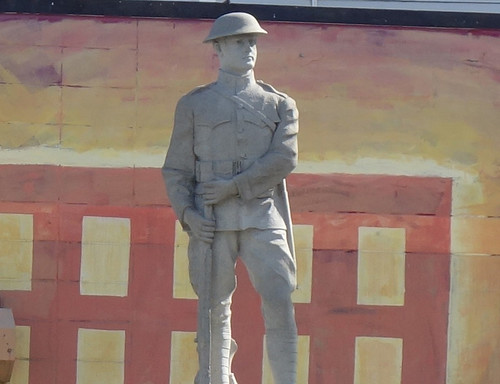Lowell in World War One: Dec 3 to Dec 8, 1917

This is the 34th weekly installment of my Lowell in World War One series which commemorates the centennial of the entry of the United States into World War One. Here are the headlines from one hundred years ago this week:
December 3, 1917 – Monday – British regain ground on Cambrai front. Mighty problems confront Congress as it reassembles for second war session. Work actually begins tomorrow when President Wilson will outline program for vigorous prosecution of war. Estimates of $13,000,000,000. More wells required at the boulevard. Commission Brown stated that unless there is sustained periods of rain, it will be necessary for him to dig up to 200 more wells along the boulevard to supply adequate drinking water since average water consumption is up considerably over last year.
December 4, 1917 – Tuesday – Wilson urges war on Austria. Immediate declaration of war recommended by President in address to Congress. Says nothing shall turn US aside until war is won and Germany is beaten. Russia and Germany sign armistice. Maximum prices for coal in Lowell. New England Fuel Administrator James J. Storrow today announced the maximum prices at which coal can be sold in Lowell. Will occupy Bigelow plant. The United States government intends to lease either by agreement or by requisition the plant of the Bigelow Carpet Co in Lowell and the plant is to be occupied entirely by the United States Cartridge Company.
December 5, 1917 – Wednesday – Delay war declaration against Austria. Postponement until next week by Congress probably as a result of conferences. Austrians on eve of war with US make new attempt to pierce Italian front. More Lowell men sent to Camp Devens. Seven more Lowell men were sent to Camp Devens today to take the place of seven others previously drafted but recently granted exemptions from service at the Camp.
December 6, 1917 – Thursday – Halifax in flames following big explosion in harbor. U.S. ammunition ship rammed by another vessel. Ships destroyed and crews killed. Freight cars blown from tracks. Explosion heard over 60 miles away. Hundreds killed and thousands injured. Half of the city of Halifax is in ruins as a result of the explosion. Bay State to aid sufferers.
December 7, 1917 – Friday – Senate votes for war on Austria. Resolution declaring war on Austria unanimously passed in Senate. People of Halifax stunned by magnitude of disaster. Police estimate dead at 2000. A heavy snowstorm that set in today has impeded relief and rescue but has also aided firemen in fighting the flames. The explosion occurred when the Belgian relief steamer Imo collided with the French munitions steamer Mont Blanc, causing the detonation of 4000 tons of trinitrotuluel, one of the most powerful explosives manufactured. Relief train from Massachusetts speeding towards Halifax with medical personnel and supplies.
December 8, 1917 – Saturday – American warship sunk. Destroyer Jacob Jones, one of the newest and largest submarine hunters in the US Navy, was torpedoed and sunk last night. Two-thirds of her crew were taken off in life rafts, the rest of the crew are missing including the ship’s commander, Lt Cdr David Bagley, brother-in-law of Secretary of the Navy Josephus Daniels. Private dispatch reports 4000 killed in Halifax disaster. Stricken city isolated. The Massachusetts relief train, which was due to arrive in Halifax early this morning, was stalled in great snow drifts last night. America’s declaration of war against Austria is seen as moral support for Italy, which is hard pressed by the Austrian-German army.